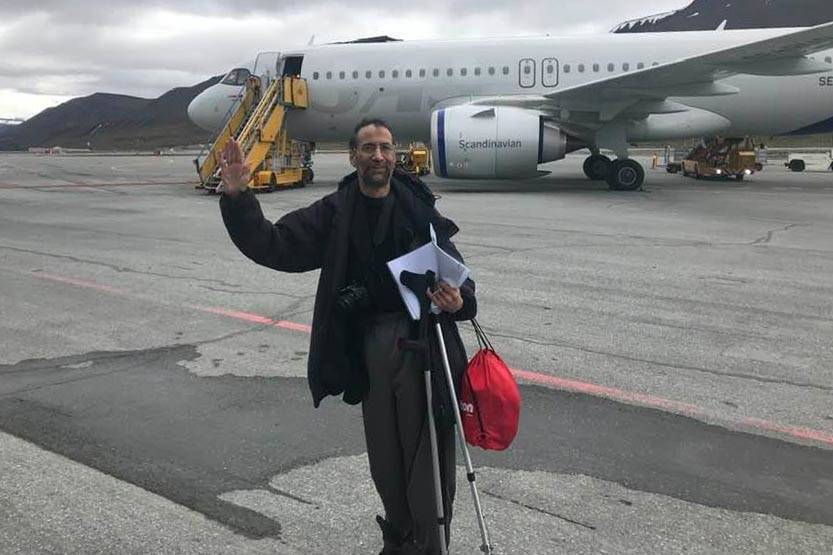This story has been updated to expand the definition of Svalbard’s legal requirements for protection from bears.
Juneau may be the northernmost capital in the United States, but it’s far from the northernmost settlement in the country.
That’s a distinction Longyearbyen doesn’t have to worry about. The northernmost permanent settlement of more than 1,000 on the planet, it’s the largest town in Svalbard, an island north of Norway.
Mark Sabbatini, a former Empire reporter and editor, recently returned to Juneau after more than a decade in Svalbard, running a weekly newspaper called Icepeople, the island’s only English-language newspaper.
“I have seen an awful lot of the world and worked as a journalist in an awful lot of the world and it is by far the most fascinating place I’ve ever seen,” Sabbatini said in an interview. “You would not believe how rich the community is, how much there is to do, how much there is to see, and I’d barely scratched the surface after all these years.”
[City extends COVID mitigation measures]
Sabbatini worked for the Empire from roughly 1994 to 2005, he said, with increasingly long sabbaticals from the job in Antarctica, co-editing the Antarctic Sun, the U.S. Antarctic Program’s newspaper. After visiting Svalbard in 2007 for the annual Polar Jazz Festival, held every January, he decided to move there.
“I was looking for jazz in the most unusual places and with the most unusual people,” Sabbatini said. “Obviously, it’s cold as hell. Who would agree to perform there?”
Longyearbyen is home to just over 2,000 permanent residents, according to the city’s website, and shares a great deal in common with Juneau and other cities in Alaska, particularly those isolated by geography. Like Juneau, Longyearbyen is a former mining town that’s adapted to changing times.
“There are some real similarities and real differences. One of the biggest things is cruise ship tourism. When I got to Svalbard, to replace the coal mines, they said they’d need twice as many ships and three times as many passengers,” Sabbatini said. “Flightseeing is banned. It’s part of the very strict environmental laws up there.”
Svalbard enforced much stricter environmental regulations for cruise ships, for reasons that would be familiar to many Juneau residents, such as concerns over gray water dumping and air pollution, Sabbatini said.
Climate change concerns have also swept the island, as housing has had to be moved over landslide concerns, and the Svalbard Global Seed Vault, which houses seeds from across the planet in case of a disaster, had to be renovated due to leakage issues, Sabbatini said. Despite that, like Juneau, it’s a town with a lively culture and opportunities for those who take them, Sabbatini said.
“Svalbard will give you as much as you put into it,” Sabbatini said. “Everyone in Svalbard is there because you want to be.”
Longyearbyen is only about 808 miles from the North Pole, according to the city website, but is kept relatively livable by the warmer water of the Gulf Stream. That isolation served it well as the coronavirus pandemic swept the globe, Sabbatini said. Unlike Juneau, Svalbard receives little rain, and is dominated by treeless tundra, Sabbatini said.
“Svalbard is one of maybe five places left without COVID,” Sabbatini said. “But we suffered worse economically than anyone else.”
Svalbard does have some residents that foreign to Juneau, in the many polar bears that inhabit the island. Everyone has to carry a gun or other form of protection when they go out of the house by law, Sabbatini said.
As recently as last August, a man was mauled to death by a polar bear in his tent, according to Sabbatini. The presence of the polar bears also means that all residents must be able to move self-sufficiently, which Sabbatini was no longer able to do after a leg injury, prompting his return to the United States.
Other oddities in Svalbard include the lack of any military presence on the island, Sabbatini said. But similar to Alaska, Russia’s influence in the region is expanding, and they often butt heads with the Norwegians and other countries in the cold expanse of the Arctic Ocean as fishing stocks, oil rights and shipping lanes shift and change.
“Russia and the EU are involved in disputes about Svalbard,” Sabbatini said. “Warlike activity is banned in Svalbard, but in the waters around it, there’s all kinds of turbulence.”
As he returns to Juneau, Sabbatini said the town is very different from the one he left a decade and a half ago.
“There will be a great many things that like, this is pleasantly familiar, and plenty of things that’s like, it’s totally different,” said Sabbatini, mourning the loss of establishments like Valentine’s. “On the other hand, the Hangar is still there, and they still serve halibut tacos.”
For the time being, Sabbatini said, he intends to keep editing for Icepeople, albeit from a distance.
“I’m still sitting here reporting breaking news from halfway around the world,” Sabbatini said.
• Contact reporter Michael S. Lockett at 757-621-1197 or mlockett@juneauempire.com.

